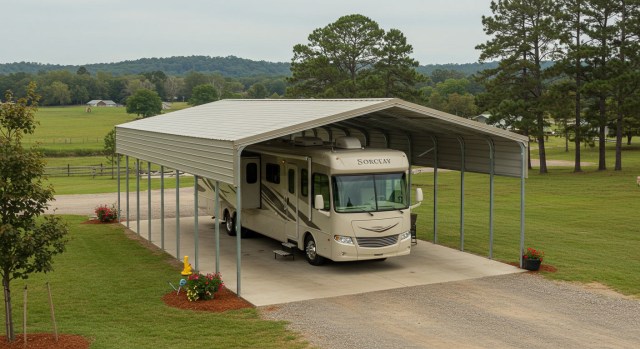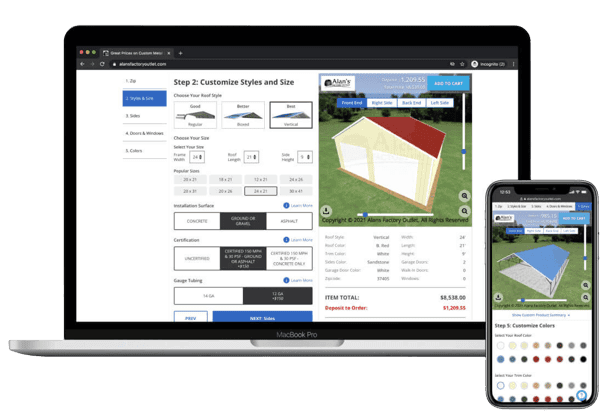If you own a recreational vehicle, you know it’s more than just a way to travel—it’s a home on wheels and a source of adventure. It’s also a pretty big investment. Like your house, your RV deserves good care and protection, especially when you park it at home. That’s why you need a good shelter for it.
Whether you’ve got a big Class A motorhome, a fifth wheel, or a smaller travel trailer, leaving it out in the open exposes it to all sorts of trouble. In this guide, we’ll walk you through some of the best RV shelter ideas for 2025. We explore everything from sturdy metal buildings to practical, cheap RV carport ideas, helping you find the right fit for your needs and budget.
Let’s dive in and find the perfect way to keep your RV safe and sound for years.
Why bother with an RV shelter? More than Just a Roof Overhead
We did a recent article on RV insurance and what it covers. As it turns out, you can get pretty decent protection for yourself, your family, your RV, whatever stuff you bring, and other motorists while on the road.
We also found out that there are things insurance simply won’t cover. Things like wear and tear and certain natural disasters, for example. While there’s not much you can do about the latter, you can do more than a few things to slow down wear and tear. One of those things is to shelter it when it’s parked at home.
Simply put, an RV shelter is an investment that protects your investment.
A dedicated RV carport or garage does much more than keep the rain off. Let’s break down why it’s such a good idea.
Shielding Your Investment from Harsh Weather Elements
Mother Nature can be tough sometimes. Excessive sunlight can beat down day after day, fading paint, cracking seals, and damaging tires. Then you’ve got pouring rain, occasional hail storms, and falling debris like branches that can cause real headaches.
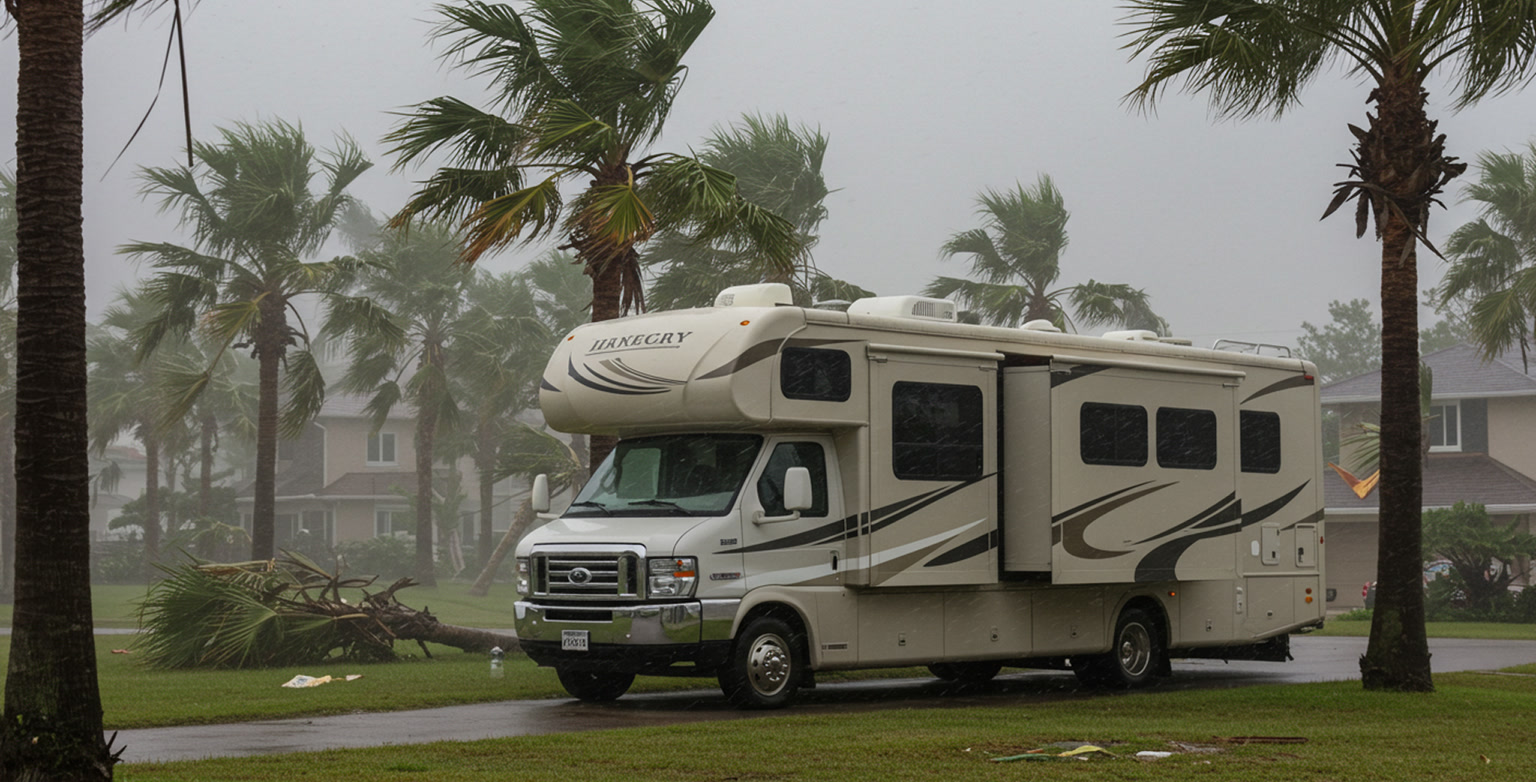
Leaving your RV exposed to these harsh weather elements is asking for trouble.
A good metal shelter acts like a shield, keeping damaging UV rays off, preventing water from pooling or leaking into the RV, and stopping dents or scratches from hail and debris.
Protecting your RV from these outdoor elements is key to keeping it looking good and working right.
Battling Strong Winds and Heavy Snow Loads
While people in the Southeast might not get buried in snow like folks in places like South Dakota, they probably still experience nasty weather. Strong winds during thunderstorms or other storms can rock your RV, potentially causing damage or even tipping smaller trailers.
Also, depending on where you live, dealing with heavy snow loads can be a real concern. That’s why, in some states like
According to the American Society of Civil Engineering, in states like New York or Pennsylvania, buildings must be able to hold at least 30 psf snow loads. However, in others like Wisconsin or Minnesota, buildings can get snow loads of 60 or 70 psf.

A well-anchored, sturdy RV shelter can withstand these challenges. Quality structures, especially those made from steel, can handle significant wind speeds and heavy snow loads, giving you peace of mind during severe weather events.
Don’t let heavy winds or unexpected snow compromise your RV.
Maintaining RV Value for the Long Haul
An RV is a big purchase. According to Cruise America, a small Class C RV runs for $75,000-$125,000, while the larger Class A can cost upward of $200,000-$300,000.
Like any vehicle, RVs depreciate over time. However, keeping them sheltered can significantly slow down that depreciation. An RV stored under cover will simply look better and have fewer weather-related issues than one left out in the elements.
Any investment in an RV shelter today will pay off when it comes time to sell by helping maintain your RV’s value.
Convenience and Adding Extra Storage Space
Having your RV right there on your property, under cover, is just plain convenient. You don’t have to worry about driving to an off-site storage facility or paying monthly rental fees for a storage unit.
Access is easy whenever you want to clean it, pack for a trip, or do some maintenance.
Plus, many RV shelters offer additional space.

A larger RV carport, an enclosed metal garage, or even a carport-shed combo like the one in the image above can easily double as storage for lawn equipment, tools, boats, or other vehicles. It’s a practical way to get more usable, protected storage space on your property.
Top 12 RV Shelter Ideas for 2025
Okay. We now understand why an RV shelter is a smart move, but there’s more than one way to set one up.
Let’s look at a few RV shelter ideas, ranging from simple covers to fully enclosed garages. We’ll focus on some of the most popular choices and design ideas in 2025 that work well for many situations.
#1. Open-Frame A-Frame Boxed Eave RV Carport
RV carports are one of the most popular RV shelter ideas, and for good reason. An A-frame, boxed eave metal carport offers a traditional look that blends nicely with many homes, featuring a peak like a house roof.
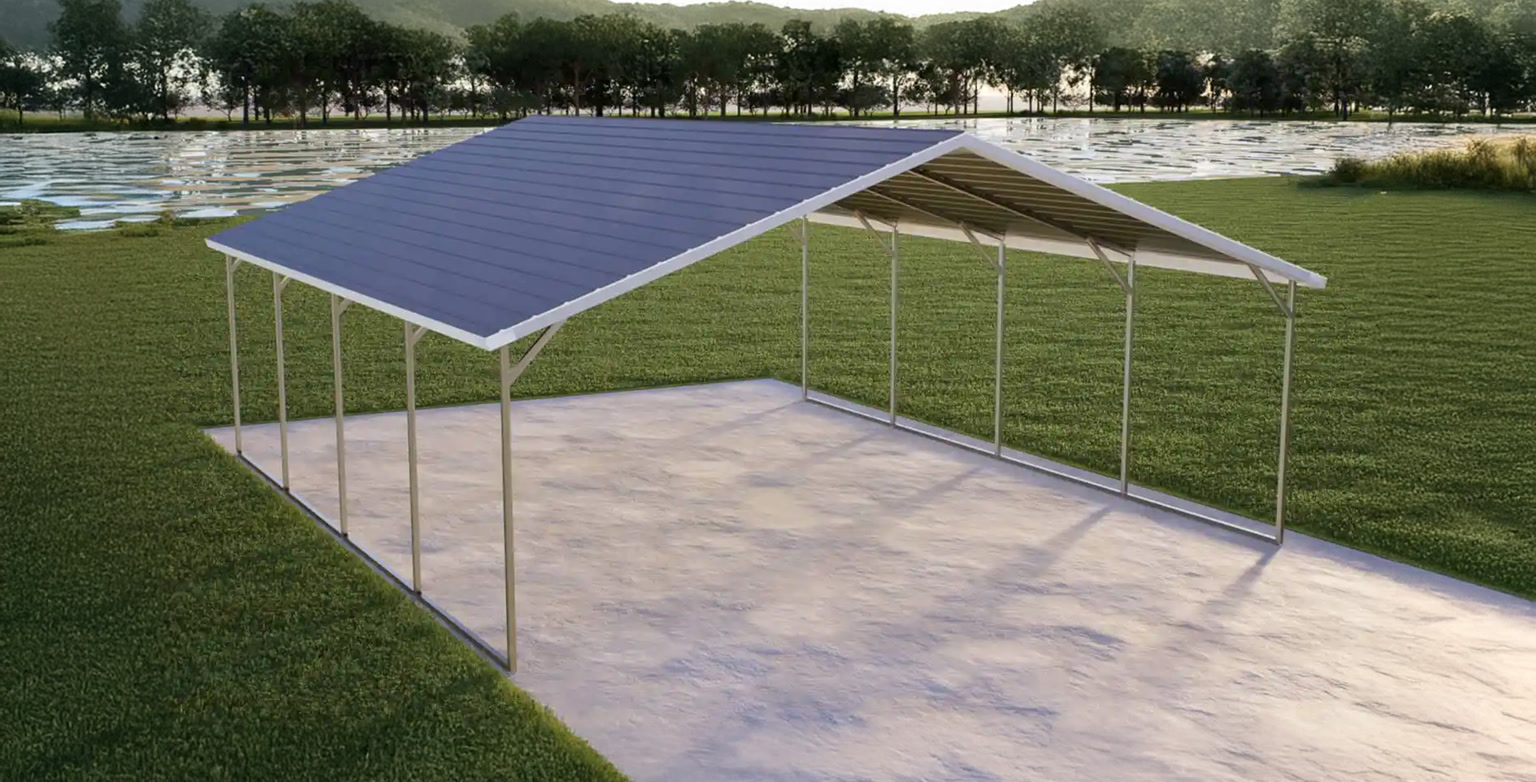
The “boxed eave” style means the roof panels run horizontally along the length of the carport, and it has trim along the eaves for a nice, finished appearance.
These A-frame carports provide excellent overhead protection using durable metal roofing. They’re typically made from strong 26- or 29-gauge galvanized steel, balancing cost, durability, and looks.
It’s a solid, middle-of-the-road choice for an RV Carport.
#2. Open-Frame Vertical RV Carport
Stepping up in terms of performance, especially for rough weather, is the vertical roof RV shelter. Like the boxed eave style, it has an A-frame design, but the key difference is the vertical roof panels. These panels run from the peak down to the eaves, much like your house’s roof.
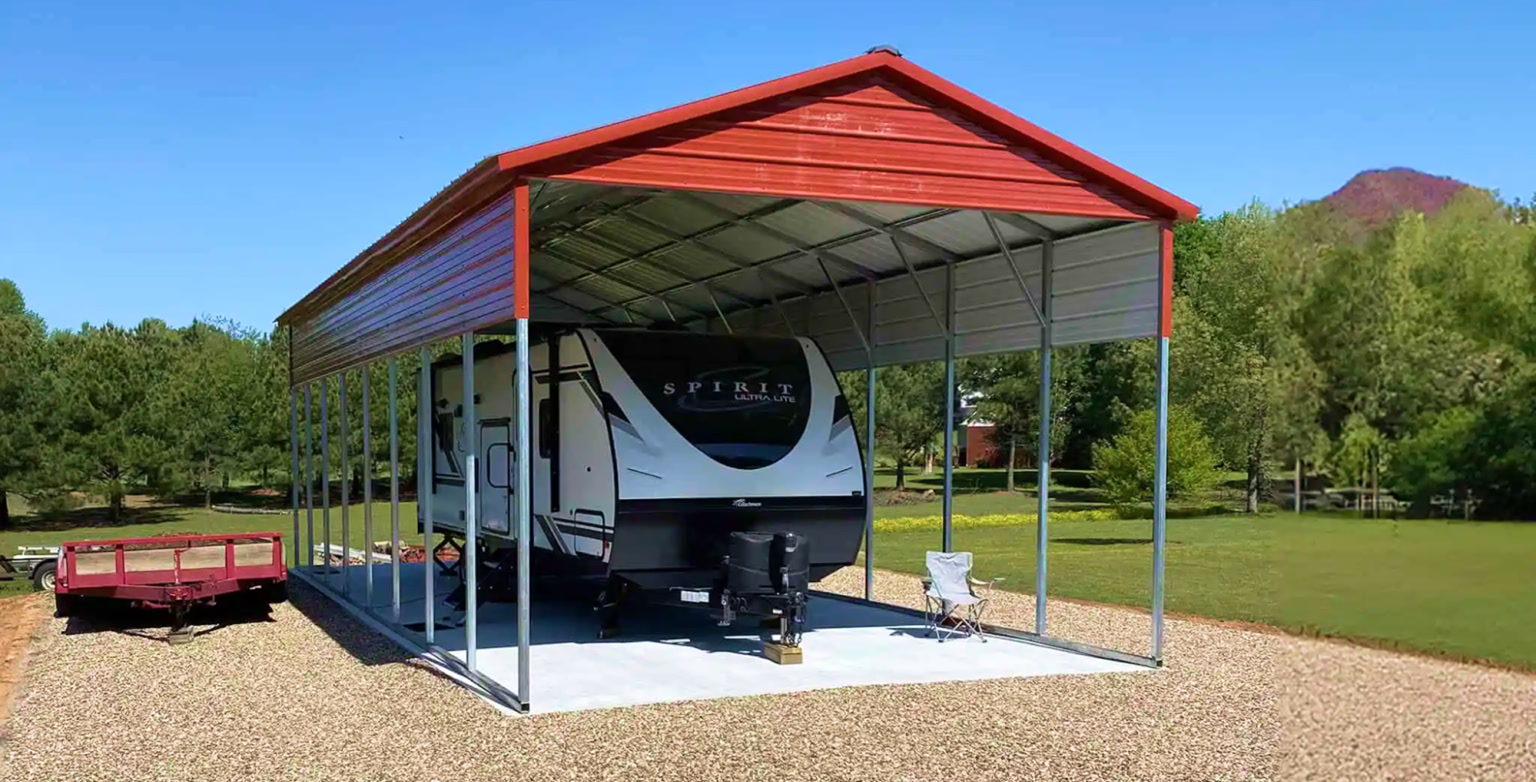
This vertical orientation is an excellent choice because it allows rain, snow, and debris to slide off easily, preventing water pooling and reducing the strain on the structure. A vertical roof also makes it possible to build larger, longer carports, ideal for long Class A RVs and trailer homes.
If you live in an area with heavy rain or even the occasional snow load, a vertical roof RV shelter built from quality structures like steel is often the best choice. It might cost a little more than other styles, but the added protection is worth it.
#3. Open-Frame Regular RV Carport
If you’re looking for one of the most budget-friendly cheap RV carport ideas that still offers sturdy protection, the regular roof metal carport is worth considering. This style has rounded, curved eaves and horizontal panels on the roof that run from front to back. It’s the original metal carport design and often the lowest-cost permanent option.
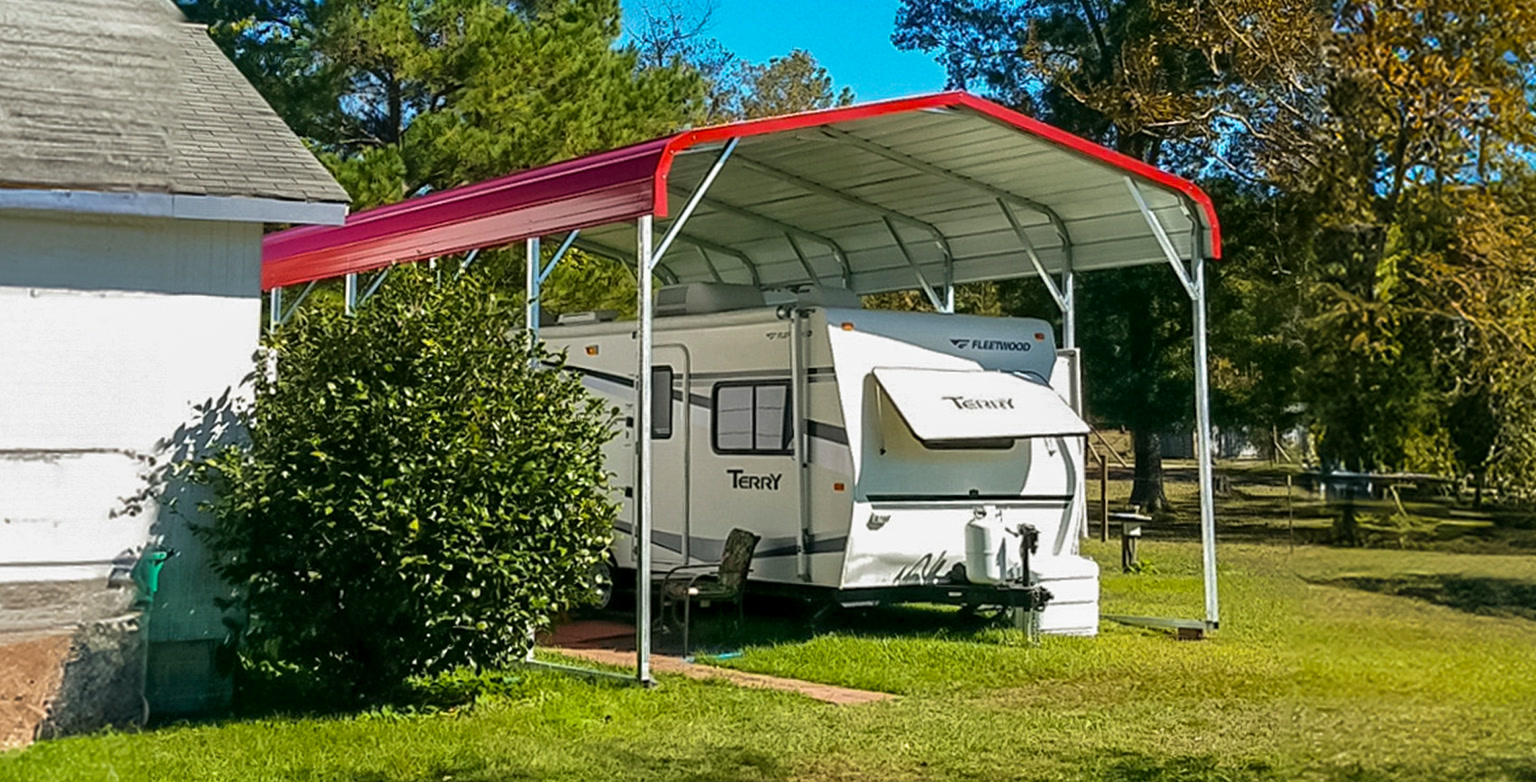
While it doesn’t shed water and debris quite as efficiently as a vertical roof, it still provides good overhead cover from sun and rain. For areas with milder weather conditions, a regular roof RV carport made with galvanized steel is a practical and affordable metal shelter.
The biggest downside to this design is the size limits. Carports with regular roofs aren’t usually longer than 35 feet, for they’ll tend to sag under snow and heavy rain. This limit will be a problem if you own one of the larger Class A RVs since they range from 26 to 45 feet long, according to Curbed.
#4. Partially Enclosed RV Carport
Want a bit more protection than just a roof? Or perhaps you just want to keep your nosy neighbor’s eyes off of your crown jewel?
You can take any open-frame carport style (regular, boxed eave, or vertical) and add partial walls or side panels. Doing so creates a partially enclosed RV Carport.
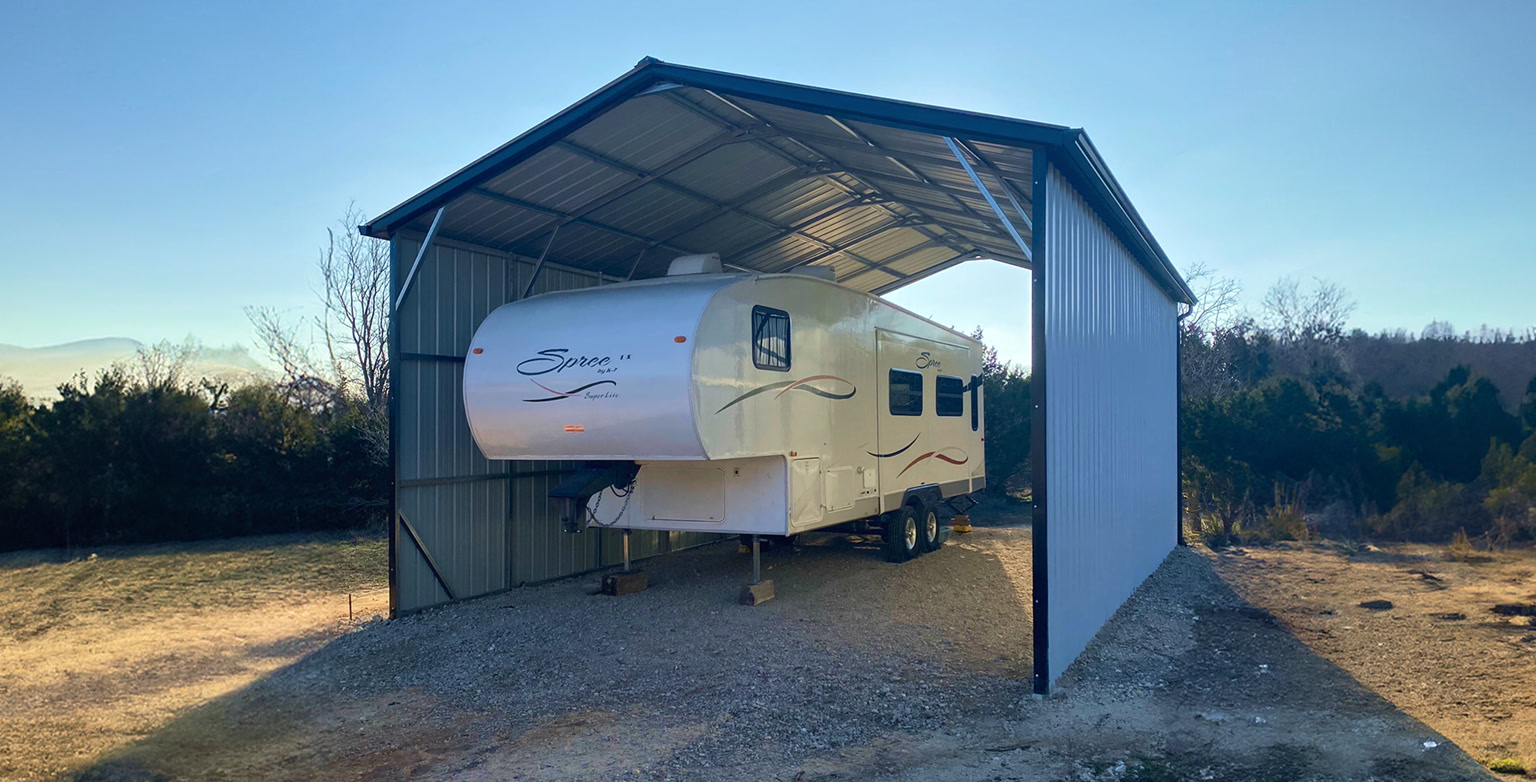
For example, you might add panels just along one side to block prevailing wind and rain or perhaps enclose both sides partway down. Adding an optional gable end, either standard or an enclosed gable, can also provide extra protection and improve the aesthetic impact.
This customization offers a good middle ground between an open carport and a fully enclosed garage, shielding more of your RV from the outdoor elements.
#5. Lean-to Metal RV Carport
If you’ve got an existing building, like a tall garage or barn, on your property, a lean-to metal carport might be a great solution. This design attaches to the side of your existing structure, which you can use for support on one side while having posts on the other.
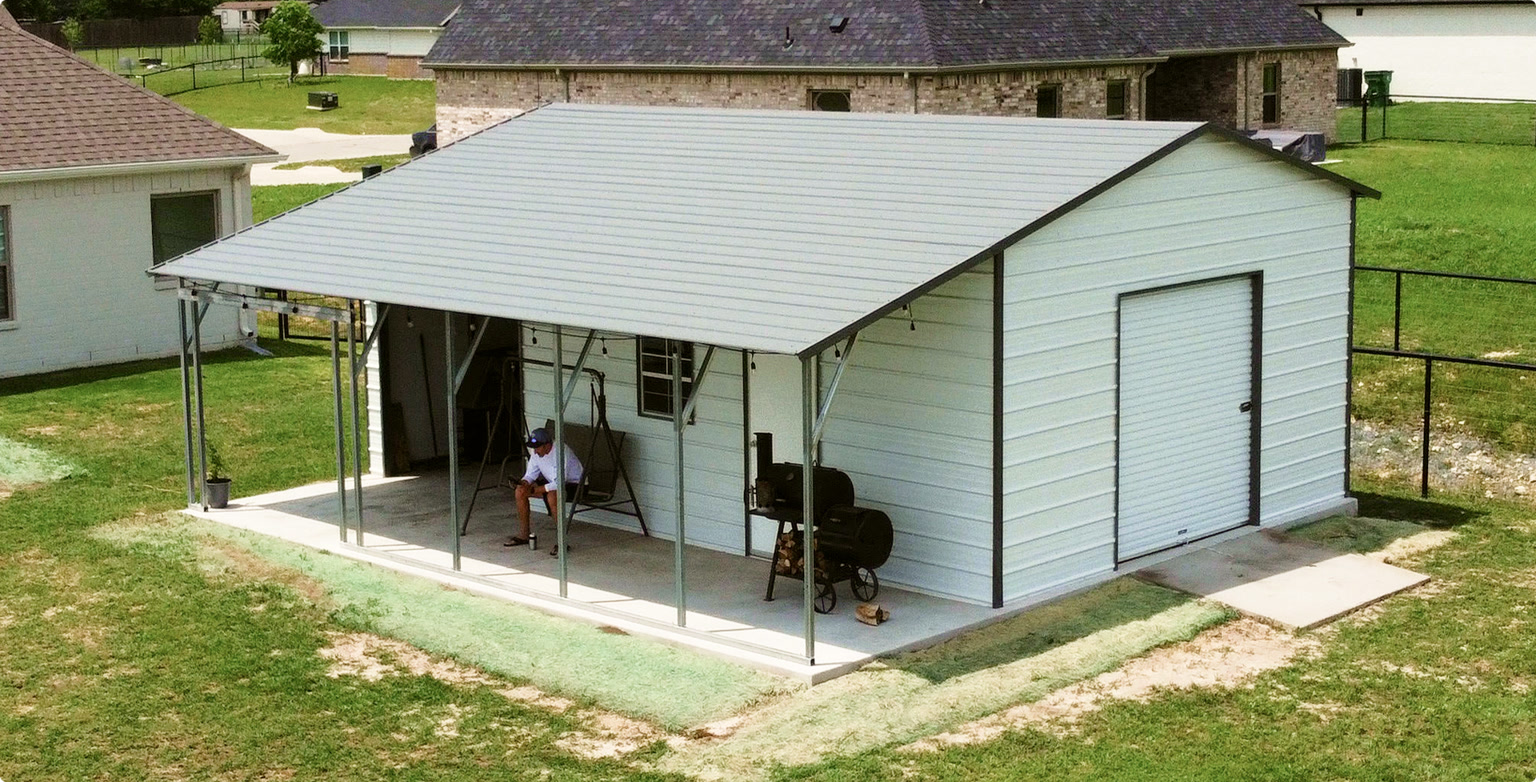
A lean-to carport is a smart way to add covered RV parking without needing a completely freestanding structure.
You can choose any roof style (regular, boxed eave, or vertical) for a lean-to, matching the carport cover to your needs and the look of your existing building. It’s an efficient way to create additional space for your RV.
#6. Detached RV Metal Garage
Nothing beats a fully enclosed metal garage for the ultimate protection and security. A detached RV garage is a standalone steel structure built specifically to house your motorhome or trailer, along with anything else you want to store securely.
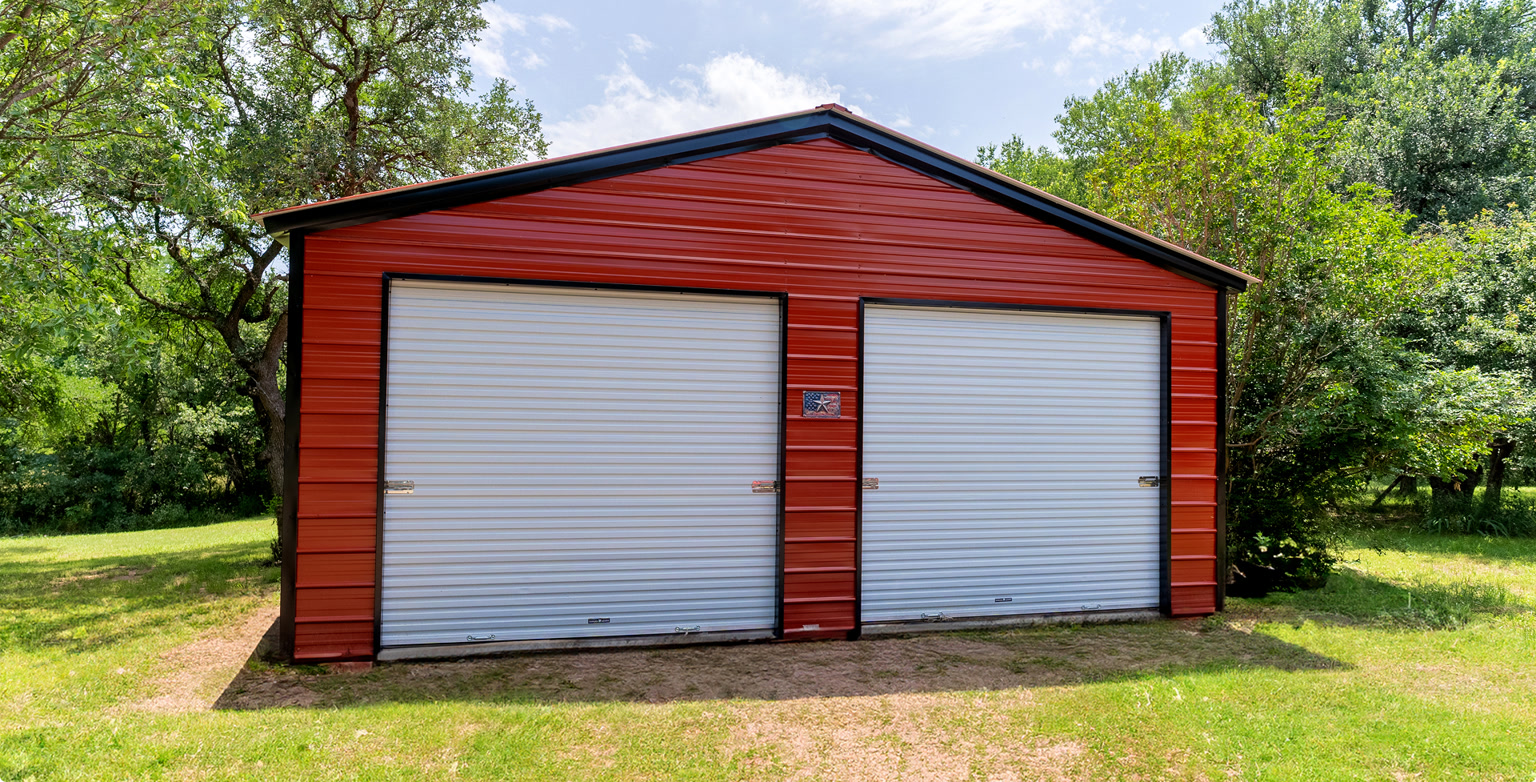
These metal garages offer complete protection from all harsh weather elements, excessive sunlight, theft, and pests.
You can customize metal garages with garage doors tall enough for your RV (like a 12-foot-high carport door equivalent), walk-in doors, windows for natural light, and even insulation.
It’s like giving your RV its own sturdy, safe home.
#7. Attached RV Garage
Similar to a detached garage, an attached RV garage offers full enclosure but is built connected to your home or another main building. This RV shelter idea lets you access your RV from inside your house, which is very convenient on rainy or cold days.
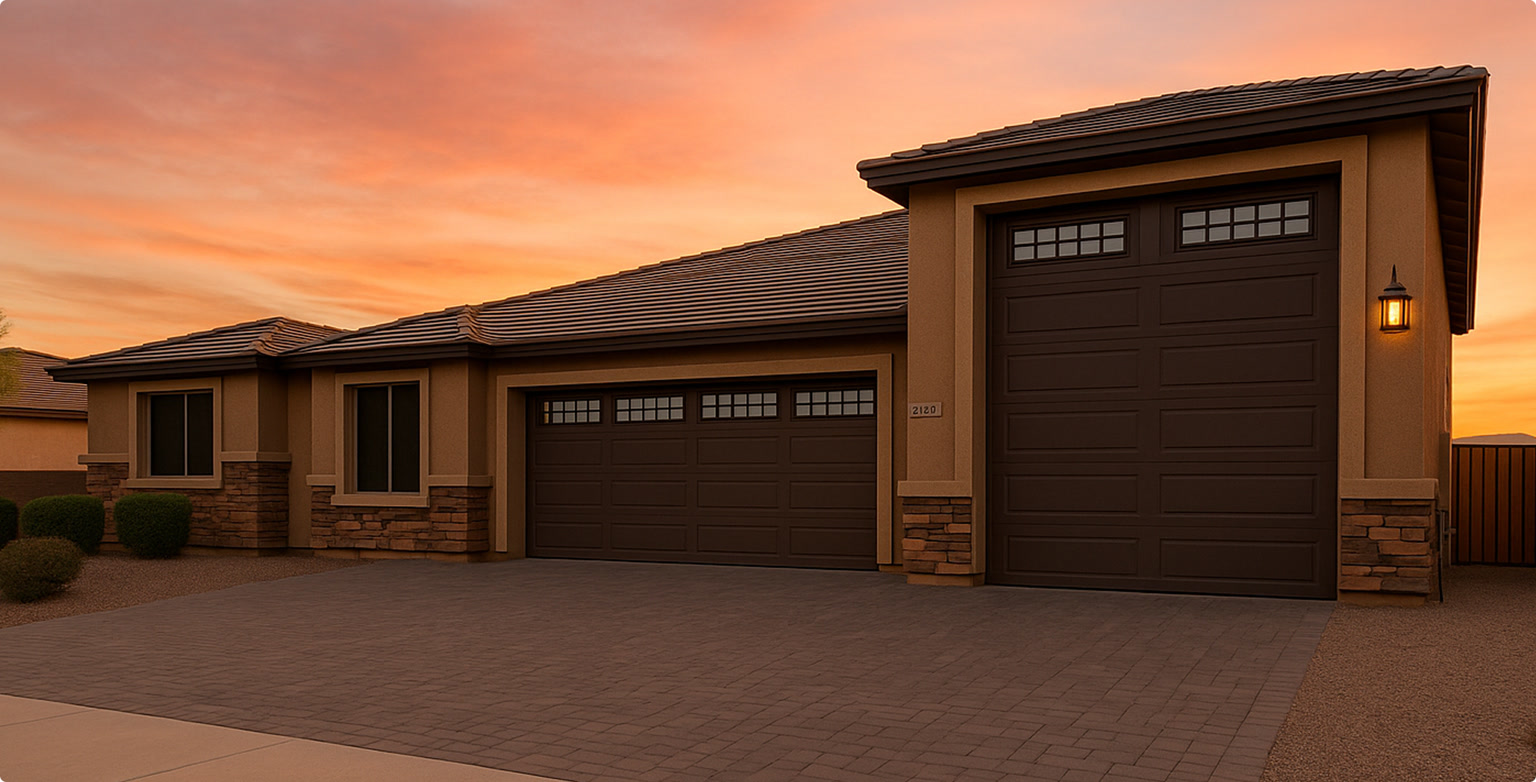
An attached garage design requires careful planning to match rooflines and ensure a proper seal between the structures. Like detached versions, these metal garages provide top-tier protection and can significantly increase your property value and usable square feet.
#8. Other Metal Buildings as RV Shelters
Sometimes, a standard carport or garage design doesn’t quite fit the bill. That’s where other types of metal buildings come in. Think about pole barns, which are very popular in many areas. Their versatility and ability to span large areas make them perfect for big rigs or multiple vehicles.
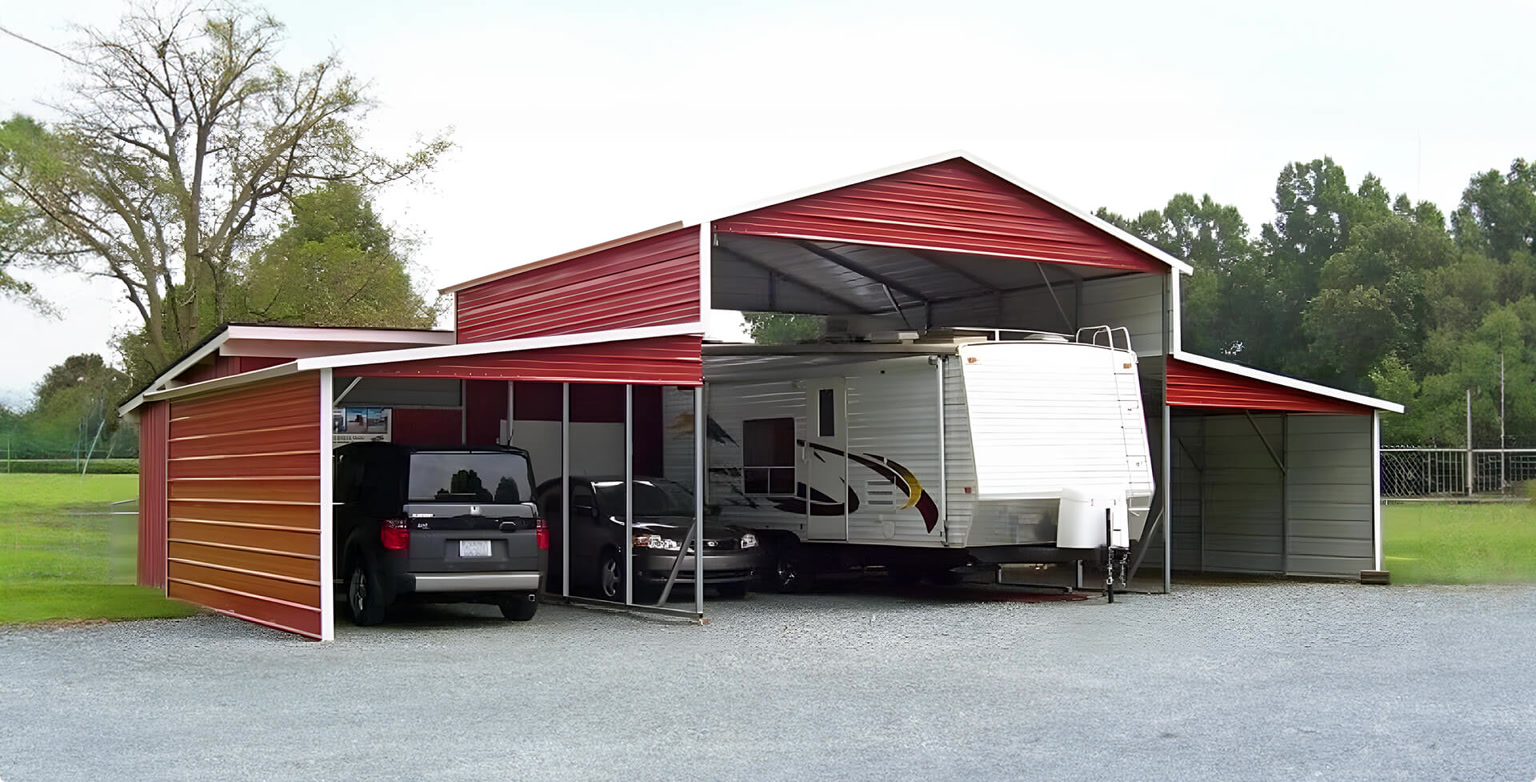
Many metal building companies, like Alan’s Factory Outlet, offer custom metal buildings, allowing you to create nearly any size or configuration you need, perhaps even matching a craftsman home design remodel or creating a mountain-style 3-car garage design.
#9. Wooden Carport
For folks who love a traditional look, a wooden RV carport is an option. Wood offers a classic aesthetic impact and can be built to match various home styles, fitting right in with classic garage design. There’s a certain charm to natural wood that many find appealing.

However, wood comes with downsides compared to metal carports:
- It’s generally more expensive upfront than a comparable metal carport. A wooden carport costs $15-$30 per square foot, while a metal carport typically ranges from $8 to $20 per square foot (Source: HomeGuide)
- It also requires significantly more maintenance—regular painting or sealing is needed to prevent rot, warping, and insect damage (like termites).
- Wood structures might not stand up as well to severe weather or heavy snow loads without substantial engineering and cost.
#10. Wooden Pergola-Style RV Shelter
A variation on the wooden shelter is the pergola style. These often feature open-lattice roofs or minimal overhead coverage, focusing more on architectural features than providing full weather protection.
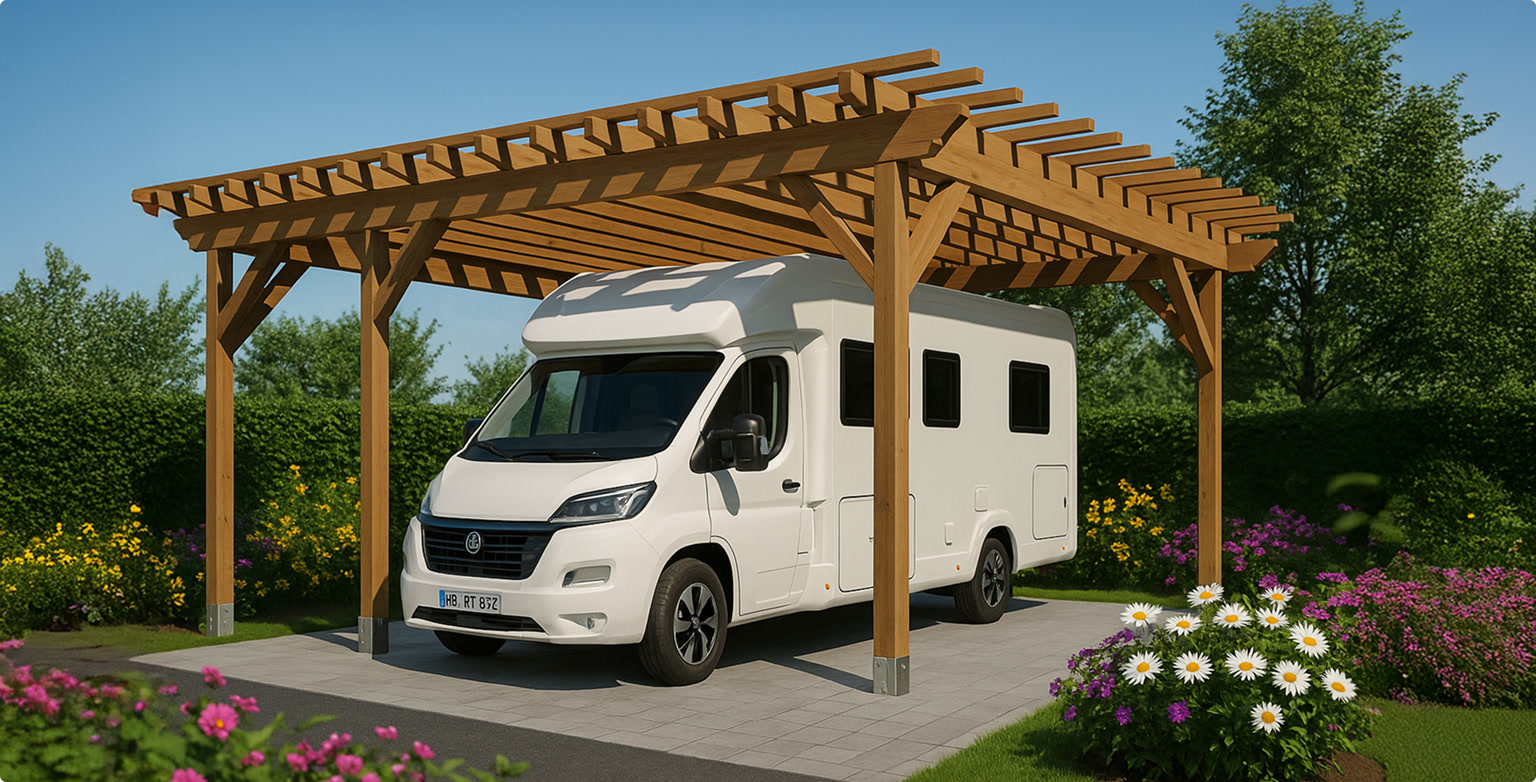
Pergolas can look quite lovely, especially with climbing vines, fitting a classic patio design.
While attractive, a pergola offers very limited protection from rain, sun, or debris. It’s more about aesthetics than practical sheltering. Like other wood structures, pergolas also require regular maintenance to prevent rot and decay, and they don’t offer much defense against strong winds or other harsh weather conditions.
#11. Brick and Mortar Garage
If you’re looking for maximum durability and a structure that truly matches a traditional home, a custom-built brick-and-mortar RV garage is the top-tier option.
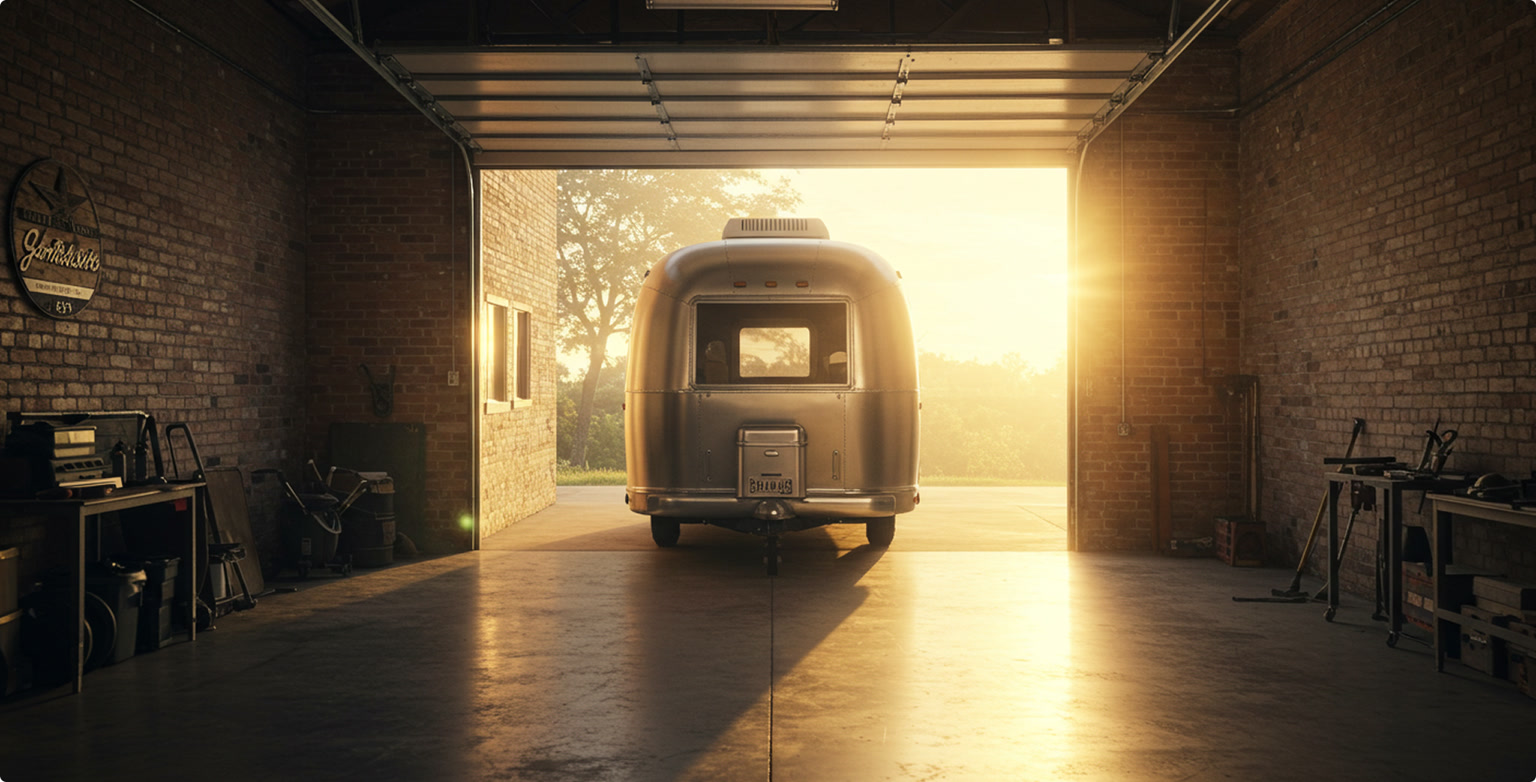
These structures are incredibly sturdy, resistant to pests and rot, and can last for generations. They offer excellent protection and can be designed to complement your home’s architecture perfectly.
The major drawbacks are cost and time.
Building a brick-and-mortar garage is by far the most expensive route for an RV shelter. It often requires extensive foundation work (think batter boards and a Concrete mixer for a serious slab) and skilled labor.
The construction process is also much longer compared to installing prefabricated metal buildings.
#12. Roof Extension with Overhang
Sometimes, the simplest solution involves modifying an existing structure. If you have a tall barn, workshop, or even a two-story house with the right layout, you might be able to extend the existing roofline to create an overhang large enough to cover your RV.
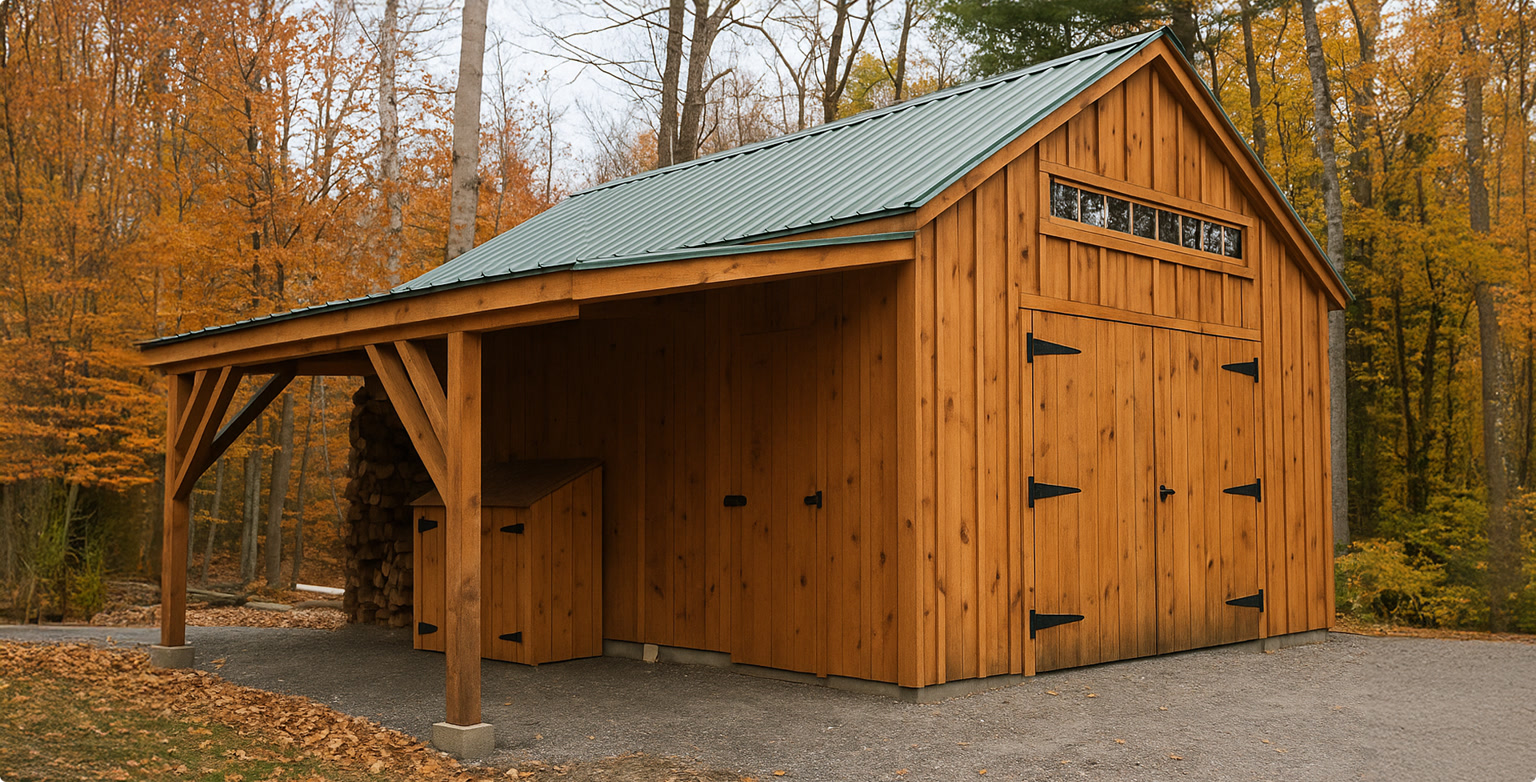
This approach can be cost-effective if the existing structure allows for it easily. However, it requires careful planning and construction to ensure the extension is properly supported and integrated with the existing roof (garage roof principles apply).
The amount of protection offered depends entirely on the size and height of the overhang.
Top 3 Cheap RV Shelter Ideas for 2025
Sometimes, budget is the biggest factor when you’re looking for RV shelter ideas. If you need protection but are watching your pennies, there are definitely some cheap RV carport ideas and other low-cost options out there. Keep in mind, though, that usually, the lowest-cost options involve some trade-offs in terms of durability or how much protection they really offer.
Here are a few popular budget-friendly choices.
#13. Portable Fabric RV Carports
These shelters use a metal frame, often made of lighter-weight tubing, covered with a heavy fabric or polyethylene tarp material. Think of them as a step up from just throwing a tarp over your RV. They offer a full canopy structure.
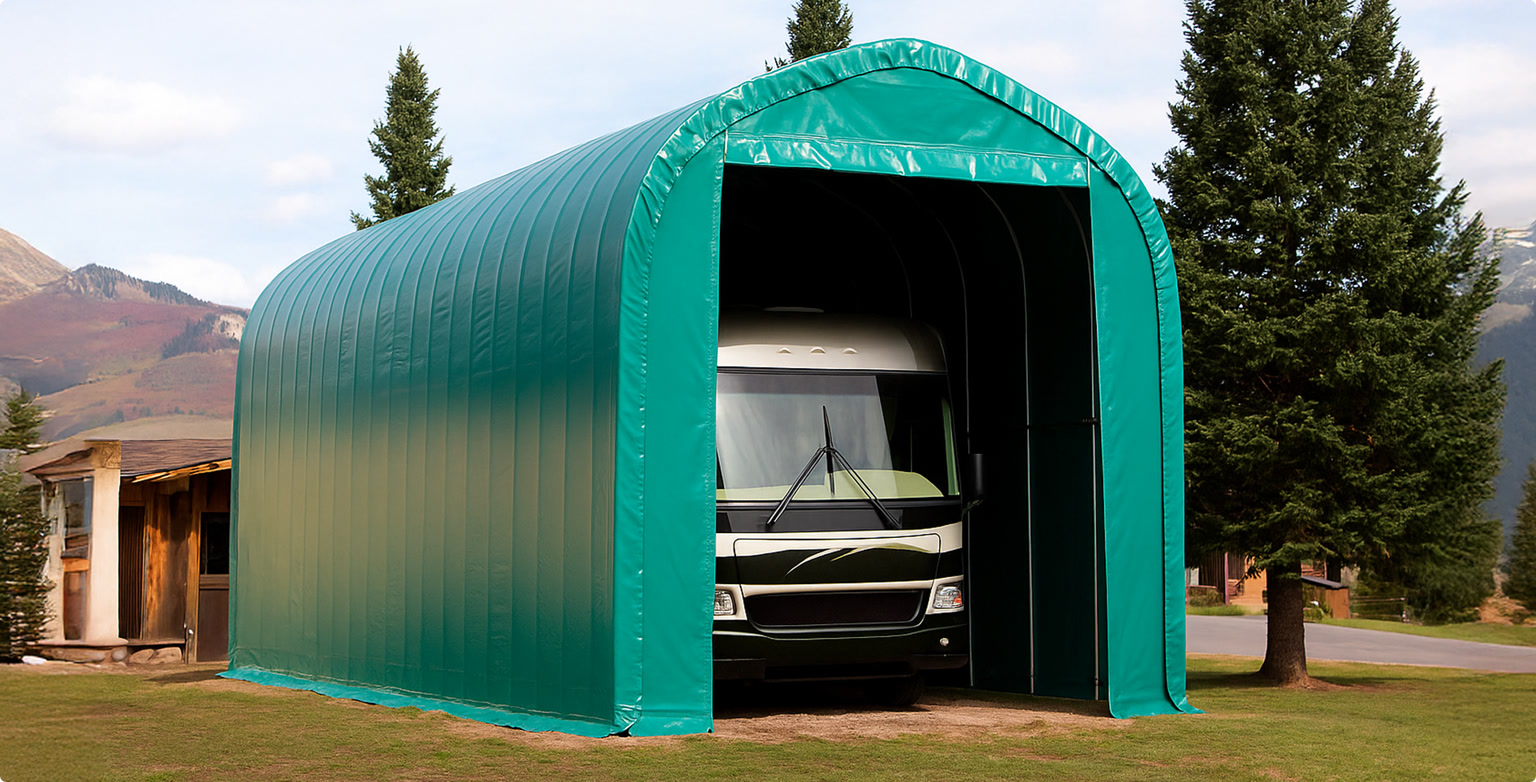
One big advantage is their portability and ease of setup compared to permanent metal buildings. If you’re renting or need a temporary solution, a Portable carport like this can be a good fit, as they often don’t require a permanent foundation or a building permit (but it’s always best to check!). They offer decent protection from the sun and light rain.
#14. Portable Metal Carports
Similar to the fabric ones, these are designed to be temporary or movable, but they use lightweight metal panels for the roof instead of fabric. Some might even include a basic frame kit you assemble yourself (modular carports idea).
These offer better durability than fabric covers, as the metal roofing will last longer. However, they are still typically made from lighter gauge steel and simpler framing than permanent metal RV carports, so they might not have the same wind or snow ratings.
#15. Heavy-Duty Tarp RV Cover
This is usually the absolute cheapest way to get some kind of cover over your RV. You can buy large, heavy-duty tarps (solid tarp or shade tarps) relatively inexpensively at places like Harbor Freight or other hardware stores. You might drape it directly over the RV or try to rig it up using poles or even nearby trees and some nylon cord.
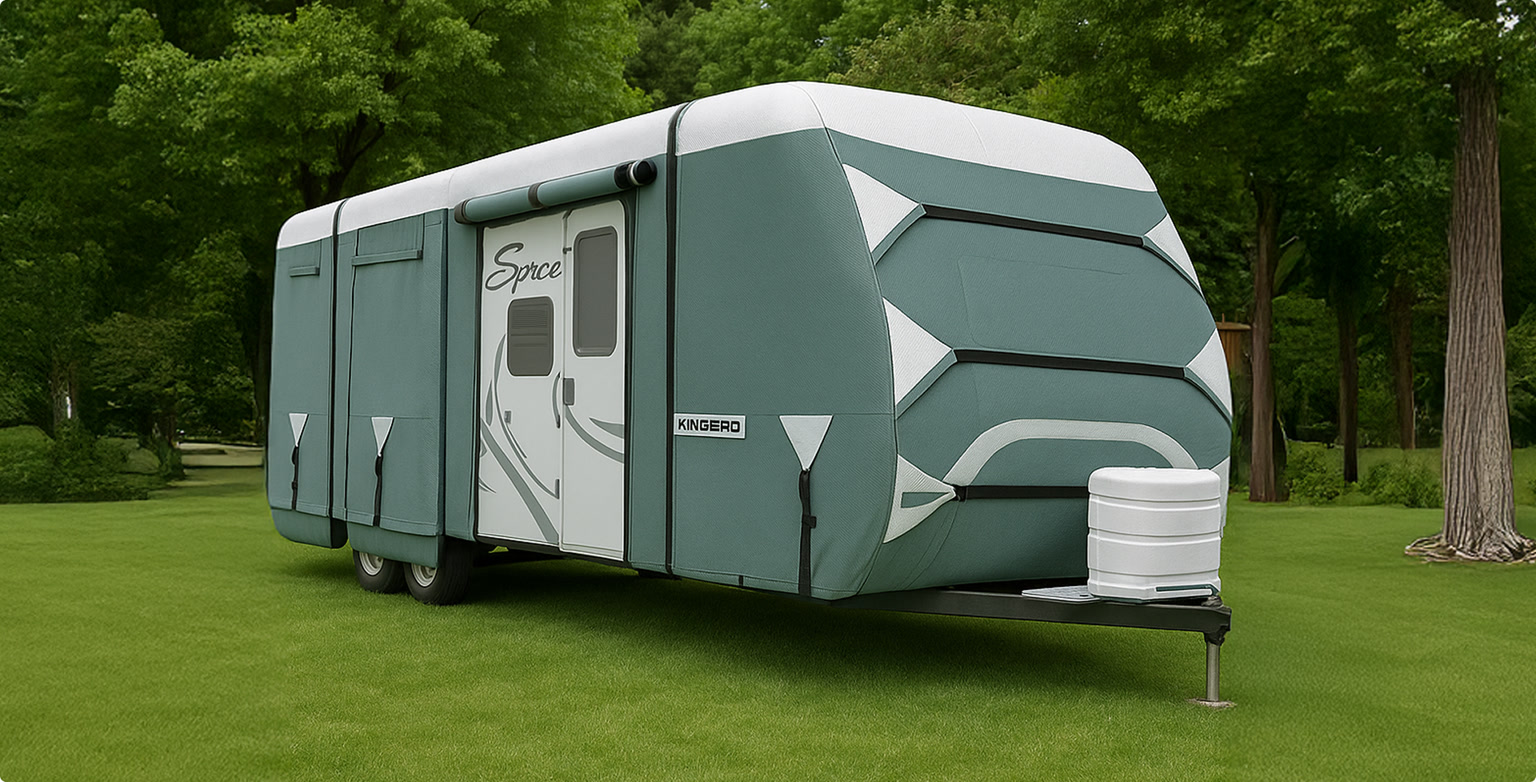
Alternatively, you can buy custom tarp covers for your RV, which are a more practical solution.
The best part of this RV shelter idea is that you can take it with you wherever you go and protect your camper or motorhome even when you’re not at home.
Designing Your RV Shelter
Okay, that covers 15 different RV shelter ideas. Now, let’s say you’ve decided on the one you like, and you’re leaning towards a more permanent structure like an RV garage or carport.
Now comes the planning part—figuring out the details to make sure it’s the perfect fit for your RV and your property.
Here are a few key things to consider:
Choosing the Right Shelter Size
RVs come in all shapes and sizes, from small Class B vans to huge Class A motorhomes and long fifth wheels. The first step is knowing your RV’s exact dimensions: length, width, and especially height (including AC units, vents, or satellite dishes!). Write these numbers down.
You’ll want your shelter to be longer, wider, and taller than your RV to provide adequate coverage and room to walk around or open slides/awnings.
For height, you need enough clearance for the RV itself, plus potentially a little extra wiggle room if you’re installing a garage door.
A 12-foot-high carport (referring to the leg height) is common for many RVs, but taller rigs might need 14-foot or even 16-foot legs.
If you’re getting an enclosed metal garage, you also need to consider the garage door size.
Here’s a general guide to the minimum dimensions for different types of RVs and trailers.
| RV Class | Minimum Carport Clearance | Minimum RV Carport Size |
|---|---|---|
| Class A | 14′ | 18′ x 50′ x 16′ |
| Class B | 12′ | 20′ x 24′ x 14′ |
| Class B+ | 12′ | 12′ x 25′ x 14′ |
| Class C | 14′ | 26′ x 36′ x 14′ |
| Super C | 14′ | 24′ x 48′ x 16′ |
| Pop-Up Trailer | 10′ | 20′ x 20′ x 12′ |
| Travel Trailer | 12′ | 30′ x 40′ x 14′ |
| Fifth Wheel Trailer | 14′ | 24′ x 40′ x 16′ |
Table source: Alan’s Factory Outlet
Always measure your specific RV! These are just general guidelines. Don’t forget to plan for enough overall square feet inside if you want additional space for storage or a workshop area (3-car garage workshop photo inspiration!).
Choosing the Right Location
Where you put your RV shelter matters. Look for a spot on your property that is relatively level—this makes the installation process much easier and is often required for proper anchoring. If the spot isn’t level, you’ll need to plan for site preparation.
Think about access. Can you easily drive your RV in and out without tight turns or obstacles? Consider clearance from trees (falling limbs!) and overhead utility lines. Also, check your local zoning rules for required setbacks—how far the structure needs to be from property lines, roads, or your house.
Preparing the Foundation
Your RV shelter needs a solid base. The type of foundation depends on the shelter type and your budget.
- Dirt/Grass: Only suitable for very temporary shelters like tarps or maybe lightweight Portable carports with appropriate anchors. Not recommended for permanent structures.
- Gravel Pad: A popular and cost-effective option for metal carports and garages. Provides good drainage and a stable base if properly compacted.
- Asphalt Pad: Less common for standalone shelters but possible. Offers a paved surface but can soften in high heat.
- Concrete Slab: The best, most durable foundation, especially for enclosed metal garages or areas needing a solid floor. Requires more site prep (setting up batter boards, potentially using a Concrete mixer or hiring pros) and cost, but provides a permanent, level base. A nice concrete patio photo can give you ideas for the finish.
You should know that there are specific requirements for each type of foundation. For example, the Florida Building Code has a dedicated section about foundations outlining concrete mixtures, slab thickness, frost protection, and other aspects of foundations for garages and carports.
No matter the type, ensure the foundation is level and complies with local building codes. Proper anchoring is crucial for stability, especially against strong winds. This anchoring process often involves driving anchors deep into the ground or using posts in concrete.
Permitting
This is a big one folks often overlook. In most areas, building a permanent structure like a metal carport or metal garage requires a building permit. Temporary structures like fabric covers or maybe some portable carports might not need one, but rules vary widely by location.
Don’t skip this step!
Check with your local city or county planning/zoning office before you buy or build.
Doors/Windows
If you opt for an enclosed metal RV garage, you have lots of choices for access and light. You’ll need a large roll-up or overhead door sized correctly for your RV (see the table above). Consider adding a smaller walk-in door for easy personal access without opening the main door.
Windows are a great way to bring in natural light, making the space more pleasant to work in. Think about placement for cross-ventilation as well. These additional features add functionality and improve the usability of your enclosed storage facility.
Ventilation
Proper air flow is crucial inside an enclosed RV shelter, especially in areas with humidity. Without good ventilation, moisture can build up, leading directly to condensation, mold, and mildew inside your shelter and potentially damaging your RV.
Options include installing vents (ridge vents, gable vents, wall vents), windows that open, or even exhaust fans. Ensuring good air circulation helps keep the inside dry and prevents musty smells.
Ready to Make Your RV Shelter Idea a Reality? Final Thoughts and Next Steps
We’ve covered a lot of ground, looking at all sorts of RV shelter ideas, from simple, cheap RV carports to fully enclosed metal garages. Protecting your RV is a smart decision that safeguards your investment, keeps it looking good, and makes ownership more convenient.
As we’ve seen, there are many options, but durable metal buildings like metal carports and metal garages often strike the best balance between long-lasting protection, low maintenance, and affordability. They stand up well to harsh weather elements, provide excellent security when enclosed, and can be customized to perfectly fit your needs and property. These quality structures are truly an excellent choice for RV owners.
If you’re ready to turn your RV carport idea into reality, we’re here to help.
At Alan’s Factory Outlet, we specialize in high-quality, affordable custom metal RV carports, garages, and custom metal buildings. Try our 3D Builder to design a custom carport or garage and make your idea a reality.
Frequently Asked Questions About RV Shelter Ideas
Do I need a building permit for an RV shelter?
It depends on the type of shelter and your local regulations. Permanent structures like metal carports and garages almost always require a building permit. Temporary shelters like fabric covers usually don’t, but Portable carports might fall into a gray area. Always check with your local city or county building department before you buy or build.
What’s the best roof style for a metal RV carport?
For the best weather protection, especially against heavy rain and potential snow load, the vertical roof RV shelter is generally considered the top choice. The vertical roof panels allow precipitation and debris to slide off easily. Boxed Eave (A-framed roof with horizontal panels) offers a good appearance, while the Regular roof metal style is often the most budget-friendly permanent option.
How tall does my RV shelter need to be?
Measure the highest point of your RV, including AC units or satellite dishes. Add at least one foot of clearance, maybe two, for easier maneuvering. Common leg heights for RV carports are 12, 14, or 16 feet, and garage door heights are typically 12 or 14 feet for most RVs.
Are metal RV shelters better than wood ones?
Metal shelters generally offer better long-term value. They are more durable against weather, pests, and fire, require significantly less maintenance (no painting/staining needed), and are often more affordable upfront than comparable wood structures. While wood has a classic look, metal buildings provide superior strength and longevity for protecting your RV investment.
Can I install an RV carport myself?
Yes, many metal carports are available as carport kits designed for DIY installation, which can save on cost if you have the tools (maybe an arc welder for some custom jobs, but usually just basic tools like wrenches, drills, and ladders needed) and are comfortable with the work. However, professional installation crew options are also available from most carport companies, ensuring the structure is assembled correctly and securely anchored by an entire crew experienced in the installation process.
